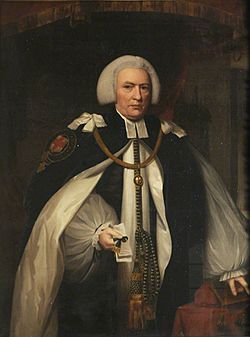John Douglas (bishop of Salisbury) facts for kids
John Douglas was a Scottish scholar and a leader in the Anglican Church, known as a bishop. He was born on July 14, 1721, and passed away on May 18, 1807.
Contents
Early Life and Education
John Douglas was born in a town called Pittenweem in Fife, Scotland. His father was a shopkeeper. John went to school in Dunbar, East Lothian. Later, he attended Balliol College, Oxford, a famous university in England. He earned his Master of Arts (M.A.) degree there in 1743.
A Life of Service
John Douglas had an interesting career that combined military service and church leadership.
Military Chaplain
In 1745, he served as a chaplain for the 3rd Regiment of Foot Guards. This meant he was a religious leader for soldiers. He was present at the Battle of Fontenoy, an important battle during that time.
Church Leadership Roles
After his time as a chaplain, John Douglas returned to Balliol College. He then took on many important roles in the church:
- In 1750, he became the Vicar of High Ercall in Shropshire. A vicar is a type of priest.
- From 1762 to 1776, he was a Canon of Windsor at St George's Chapel, Windsor. This is a special position within the church.
- In 1777, he joined the leadership of St Paul's Cathedral in London.
- He became the Bishop of Carlisle in 1787. A bishop is a senior leader in the church.
- In 1788, he was named the Dean of Windsor.
- Finally, in 1791, he became the Bishop of Salisbury. As Bishop of Salisbury, he also held the title of Chancellor of the Order of the Garter, a very old and respected order of knights.
Other Achievements
John Douglas also received other important recognitions:
- He earned a Doctor of Divinity (DD) degree in 1758.
- He became a Fellow of the Royal Society. This is an honor for people who have made important contributions to science.
- He also became a Fellow of the Society of Antiquaries of London, which focuses on history and old things.
Literary Work and Writings
John Douglas was very involved in writing and discussing ideas. He often wrote about different topics and took part in public debates.
Debates and Defenses
Under the support of the Earl of Bath, John Douglas joined several literary discussions:
- In 1750, he defended the famous writer John Milton. Milton was accused of copying other people's work, but Douglas argued against this.
- In 1754, he wrote a book called Letter on the Criterion of Miracles. In this book, he disagreed with the ideas of David Hume, a philosopher who focused on reason.
- He also criticized the followers of John Hutchinson in his book Apology for the Clergy (1755).
Editing Important Works
John Douglas also helped to edit and publish important writings by others:
- He edited the Journals of James Cook, the famous explorer.
- He also edited the Diary and Letters of Edward Hyde, 1st Earl of Clarendon in 1763.
After he passed away, a collection of his writings called Miscellaneous Works was published in 1820. It included a short story about his life.
Family Connections
John Douglas had a sister who ran the British Coffee House. This was a well-known meeting place in London, especially for people from Scotland.
 | George Robert Carruthers |
 | Patricia Bath |
 | Jan Ernst Matzeliger |
 | Alexander Miles |


